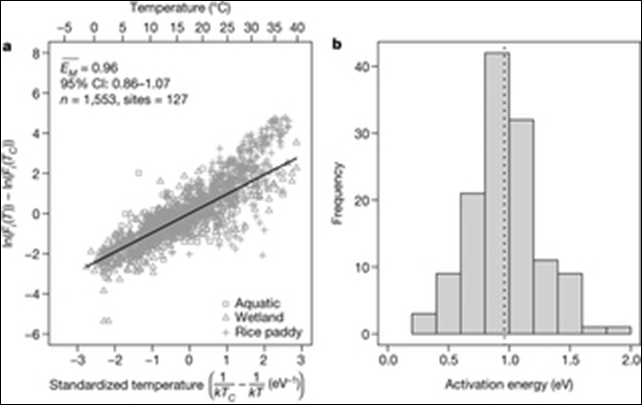Global warming speeds up methane emissions from freshwater
By Tim Radford
20 March 2014 (Climate News Network) – Methane or natural gas is a greenhouse gas. Weight for weight, it is more than 20 times more potent than carbon dioxide (CO2) over a century, and researchers have repeatedly examined the contribution of natural gas emitted by ruminant cattle to global warming. But Gabriel Yvon-Durocher of the University of Exeter and colleagues considered something wider: the pattern of response to temperature in those natural ecosystems that are home to microbes that release methane. They report in Nature that they looked at data from hundreds of field surveys and laboratory experiments to explore the speed at which the flow of methane increased with temperature. Microbes, algae, freshwater plants, and animals are all part of an active ecosystem and take their nourishment from and return waste to the atmosphere. Healthy plants take CO2 from the atmosphere with photosynthesis. Most of the methane in freshwater systems is produced by an important group of microbes called Archaea that live in waterlogged, oxygen-free sediments and play an important role in decay. Plant uptake of CO2 is affected by temperature, and so is microbial methane production. Respiration also releases CO2. The questions the researchers set out to answer were: which gas is more likely to be released in greater quantities as temperatures rise? And is the outcome the same whether they examine the Archaea only, or all the microbes in an ecosystem, or the entire package of submerged freshwater life? The answer is, the scientists say, that methane emissions go up with the mercury, and that the ratio of methane to CO2 also goes up in step with temperature. And the result is the same whether you consider the microbes or the whole ecosystem. “The discovery that methane fluxes are much more responsive to temperature than the processes that produce and consume carbon dioxide highlights another mechanism by which the global carbon cycle may serve to accelerate rather than mitigate future climate change,” said Dr. Yvon-Durocher. [more]
Global Warming Speeds Up Methane Emissions From Freshwater
ABSTRACT: Methane (CH4) is an important greenhouse gas because it has 25 times the global warming potential of carbon dioxide (CO2) by mass over a century1. Recent calculations suggest that atmospheric CH4 emissions have been responsible for approximately 20% of Earth’s warming since pre-industrial times2. Understanding how CH4 emissions from ecosystems will respond to expected increases in global temperature is therefore fundamental to predicting whether the carbon cycle will mitigate or accelerate climate change. Methanogenesis is the terminal step in the remineralization of organic matter and is carried out by strictly anaerobic Archaea3. Like most other forms of metabolism, methanogenesis is temperature-dependent4, 5. However, it is not yet known how this physiological response combines with other biotic processes (for example, methanotrophy6, substrate supply3, 7, microbial community composition8) and abiotic processes (for example, water-table depth9, 10) to determine the temperature dependence of ecosystem-level CH4 emissions. It is also not known whether CH4 emissions at the ecosystem level have a fundamentally different temperature dependence than other key fluxes in the carbon cycle, such as photosynthesis and respiration. Here we use meta-analyses to show that seasonal variations in CH4 emissions from a wide range of ecosystems exhibit an average temperature dependence similar to that of CH4 production derived from pure cultures of methanogens and anaerobic microbial communities. This average temperature dependence (0.96 electron volts (eV)), which corresponds to a 57-fold increase between 0 and 30°C, is considerably higher than previously observed for respiration (approximately 0.65 eV)11 and photosynthesis (approximately 0.3 eV)12. As a result, we show that both the emission of CH4 and the ratio of CH4 to CO2 emissions increase markedly with seasonal increases in temperature. Our findings suggest that global warming may have a large impact on the relative contributions of CO2 and CH4 to total greenhouse gas emissions from aquatic ecosystems, terrestrial wetlands, and rice paddies.
Methane fluxes show consistent temperature dependence across microbial to ecosystem scales
